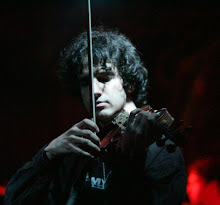Barack Obama launches his presidency talking of a “new era of responsibility”

AN ENORMOUS crowd of a million or more thronged to the National Mall in Washington, DC, for the inauguration of Barack Obama on Tuesday January 20th. The gathering was perhaps the most festive and numerous in memory, as people cheerily waved flags in the bitter cold, others chanted “O-ba-ma” and “Yes we can”; many faces were covered in tears of joy. Millions more, around America and the world, watched the event live on television.
Mr Obama spoke with some eloquence, but used the occasion to give warning repeatedly of difficult times ahead and the need for sacrifice. His favoured metaphors, appropriately for the chilly day, referred to “icy currents”, “this winter of our hardship” and of the need to take “unpleasant decisions”. He delivered a sober speech restating the message that America is entering a “new era of responsibility” and decrying “our collective failure to make hard choices”. It might have been easier to deliver an uplifting, celebratory speech. He might have chosen to say more than he did about the huge symbolic significance of a black man becoming president of America. Instead, by choosing to talk of hardships and sacrifice, the new president has begun the work of preparing voters for prolonged economic malaise, among other difficulties. Such a speech made sense politically, too: it was shrewd to emphasise just how dreadful a mess he is inheriting from his predecessor.
The new president hinted at some specific themes, many of them familiar from his campaign, that mark a significant shift from the administration of George Bush. He spoke of the need to make greater use of solar, wind and other energy, for the sake of both the environment and for reasons of energy security. He gave warning that some unspecified government programmes might have to be cut. On the economy, noting that “we are in the midst of crisis”, he pledged spending on roads, bridges and other infrastructure.
His language was clearest and most evocative on foreign and security policy. He talked of beginning to leave Iraq, and rejected a “false” choice between safety and democratic ideals, referring to the torture and detention policies of the grey-haired Mr Bush sitting nearby. But he made no mention of closing Guantánamo Bay. Rather than talk of a “war on terror”, he spoke of a war against a far-reaching network of violence and hatred. And he asserted, again, his wish to reach out to other countries (in sharp contrast to Mr Bush’s talk of being with or against America). Addressing the Muslim world, he said that “we seek a new way forward, based on mutual interest and mutual respect.” Perhaps alluding to Iran, he said “we will extend our hand if you are willing to unclench your fist.”
Near the end of his speech, he extolled those in America’s armed forces who “find meaning in something greater than themselves.” He called on more Americans, not just those in uniform, to join the effort as well. Will he succeed? John Kennedy made a similar call 48 years ago, taking office, like Mr Obama, with the political winds at his back. But the hope of Camelot was ultimately trumped by the despair and political cynicism of Vietnam and Watergate. Mr Obama enjoys an enormous stock of goodwill, but the challenges he faces are so serious that he may struggle to do more than try to manage one crisis after the next. He delivered a strong and passionate speech, but that was the easy part.
From Economist.com, Jan 20th 2009 | NEW YORK

Nenhum comentário:
Postar um comentário